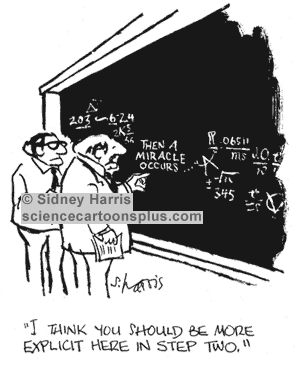Ivellious wrote:Zoe: I and all other evolutionary biologists admit that we cannot typically witness macroevolution because of the brief lifespans we have.
I don't think that's a legitimate objection. I'm no biologist, but I'm aware of species (some bacteria, if I recall right), which multiply with a rate so fast that we could, in fact
should witness an increase of the amount of information in the genome. We haven't, though.
Ivellious wrote:Because science uses evidence and experimentation and observation to draw its conclusions. We can't use God in science because we can't observe him. We can't experiment on him.
This is true, but does that make God non-existent? Since humans were the ones who created the standard of what is scientific (observability, repeatability etc.), it's not valid to dismiss something if it doesn't stand up to those standards. We have other methods, such as philosophy, to work with the unobservable. Our mind, for instance, is not observable (though materialists will say it is), but the fact is that we can't measure it or quantify it. There isn't such thing as a kilogram of consciousness.
Ivellious wrote:There is no evidence pointing to it at this point.
Maybe it's time to update the standard of defining "evidence."

Ivellious wrote:It's not crazy to say that God must have created science if he created the universe...but that doesn't mean that science should just insert "because God said so" into every problem without a known solution. Nothing progresses that way.
Early scientists realized this, that we don't learn anything just by assuming supernatural intervention and accepting it. Science need not be mutually exclusive with religion, but they should not mix together like ID desires. ID wants science to stop working on the origins of life. It wants to end something that conflicts with the literal biblical account of creation.
But, Christians have never used "because God said so" instead of researching. Some of the most renowned scientists in history were Christians.
http://creation.com/scientists-of-the-p ... ator#early
However, the question posed here is
how life arised on Earth. I see three possibilities:
---------------------------------------------------------------------------
Probability of humans repeating the process
God created life, using powers available only to Him ----------------------
None
God created life, by setting up a series of unlikely events ----------------
Low
Life arised by itself, via natural processes ----------------------------------
High
All attempts to create life so far have failed, in spite of the sophisticated technology. My opinion is, if life is something that can arise by itself and evolve over time, it shouldn't be a problem to repeat it in the lab, where we can simulate the most favourable conditions for life. Now, we could say that we may be missing some key ingredients or knowledge (
science-of-the-gaps), but to reject theism completely - especially at this point - because it's "unscientific", would be
the same thing you accuse religious people of doing. I would be primarily concerned with what is
true. Whether or not someone classifies it as "scientific", is less relevant.
